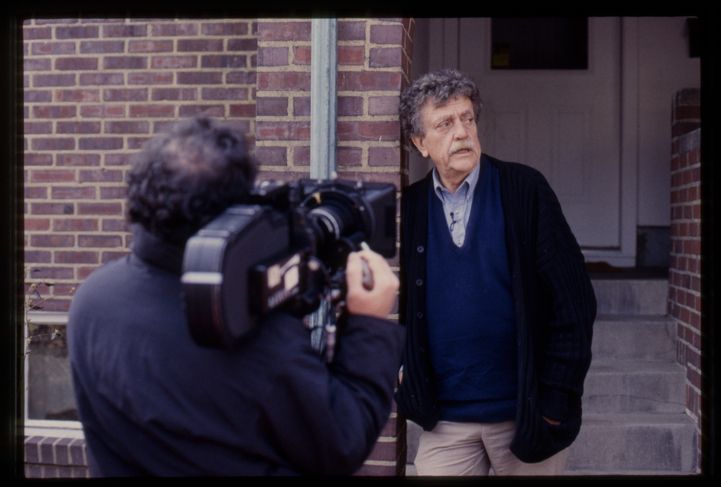


July 26, 2022
KURT VONNEGUT: UNSTUCK IN TIME is an astonishingly revealing, beautifully rich and almost unbearably moving document of a true American literary legend; and a fantastic primer for those not familiar with Vonnegut’s influential and vital body of work.
The decades-in-the-making feature documentary from Emmy Award-winner Robert Weide (CURB YOUR ENTHUSIASM) is filled with rare archival footage and interviews with family, colleagues, and Vonnegut himself, offering an intimate look into a literary giant.
There are innumerable lessons that we can take from KURT VONNEGUT: UNSTUCK IN TIME, but for us, Vonnegut’s philosophy and meditations on war, technology, and being kind in the face of fear remain the foundations of his extraordinary life and work…
ON WAR
“Perhaps, when we remember wars, we should take off our clothes and paint ourselves blue and go on all fours all day long and grunt like pigs. That would surely be more appropriate than noble oratory and shows of flags and well-oiled guns.”
Listen… literary fame came relatively late to author Kurt Vonnegut, with the publication, in 1969, of his anti-war novel Slaughterhouse-Five. The book, based on Vonnegut’s experiences as a prisoner of war in Dresden when it was bombed during World War Two, is an unclassifiable, iconoclastic masterpiece, a mixture of time travelling sci-fi, slapstick comedy, memoir, and moving meditation on existence, that propelled Vonnegut to superstardom, and hasn’t been out of print since. Anyone who has read it will understand why.
Informing the book was a peculiar incident - Vonnegut claimed to have hugged a tree, and, in that moment, to have witnessed everything that happened during the firebombing of Dresden - before the incident had even happened. Rather than write a typical war memoir - which he struggled to do - and wary of glorifying war, which he knew, from first-hand experience, was anything but glorious, Vonnegut subsequently came up with a novel that The Guardian, in 1970, declared was ‘the oddest and most directly and obliquely heart-searching war book for years’.
ON TECHNOLOGY
“All the new technology seems redundant to me. I was quite happy with the United States mail service. And, I don't even have an answering machine, for God's sake”
Before hitting the big time with Slaughterhouse 5, Vonnegut had railed against technology with books like Player Piano and Cat’s Cradle, sounding a clarion call for what he felt was an alarming development in the supposed ascent of man.
He was keenly aware of the dehumanising effects of technology, and how convenience and ‘progress’ can actually be a detriment to humankind. He first encountered this working for General Electric in the 1950s - the company was making huge steps forward, and at first Vonnegut was excited by the potential of science and invention. But then he saw its application could not only be to the benefit of man, but also a massive detriment. Namely in the form of the bomb dropped on Hiroshima.
It was almost as if at that point he turned his back on technology. For his entire writing career, he used a typewriter, and never sent an email. He once recounted about the time he told his wife he was going out to buy an envelope. “A single envelope?” she said. “You can buy a box from Amazon and save yourself the time.” He explained to her that he didn’t want to save the time. That he wanted to go for a walk, to talk to the cashier at the store, to maybe bump into someone along the way. It wasn’t about the envelope. It was about getting the envelope. Not having a computer get it for him.
“The moral of the story,” Vonnegut said, “is we're here on Earth to fart around. And, of course, the computers will do us out of that. And, what the computer people don't realise, or they don't care, is we're dancing animals. You know, we love to move around.”
ON BEING KIND
“Hello babies. Welcome to Earth. It's hot in the summer and cold in the winter. It's round and wet and crowded. On the outside, babies, you've got a hundred years here. There's only one rule that I know of, babies - God damn it, you've got to be kind.”
After witnessing the horrors of war, Vonnegut had two choices ahead of him - let what he had seen infect his life, or realise existence was a cosmic joke, and laugh along with it. He chose the latter path, deciding to write comedy books about serious subjects (war, the futility of existence, the end of the world, and so forth). He suggested that “Laughing is good exercise. It's like jogging on the inside.”
Vonnegut’s skewed, prophetic visions are more vital and astonishing now than ever before. An early adopter of environmental issues, a humanist, and something of a prophet of mindfulness, writing about “how to act decently in an indecent society”, he was pleading with people to ‘be kind’ to one another decades before it became the hashtag du jour. Dip into any of his books and you will find something thought-provoking and alarmingly prescient.
KURT VONNEGUT: UNSTUCK IN TIME – Out now in cinemas & on altitude.film.
